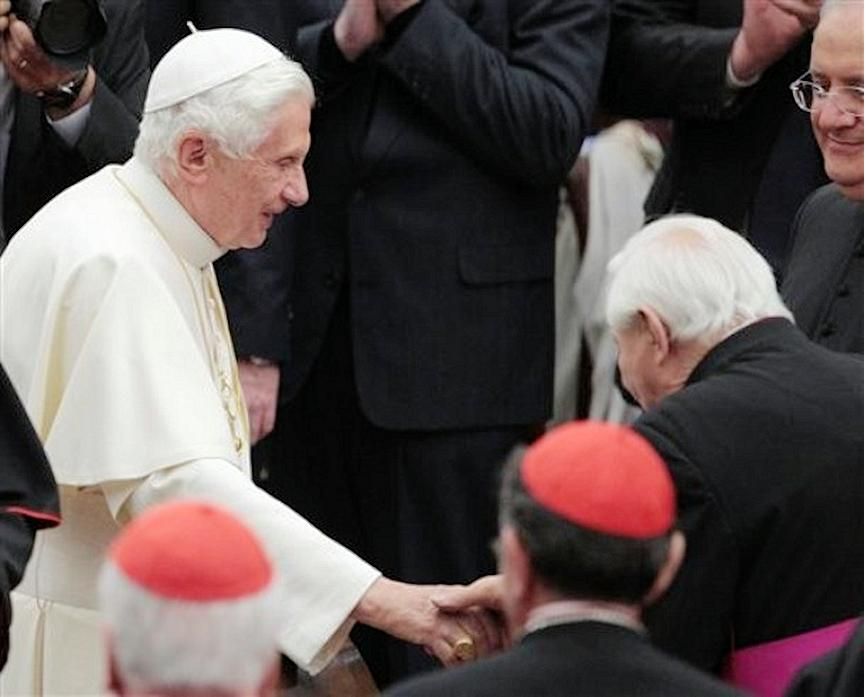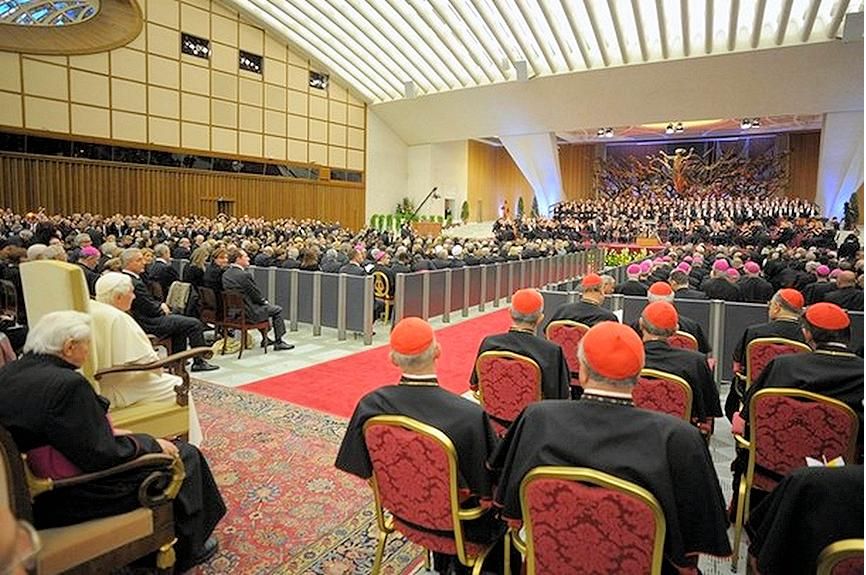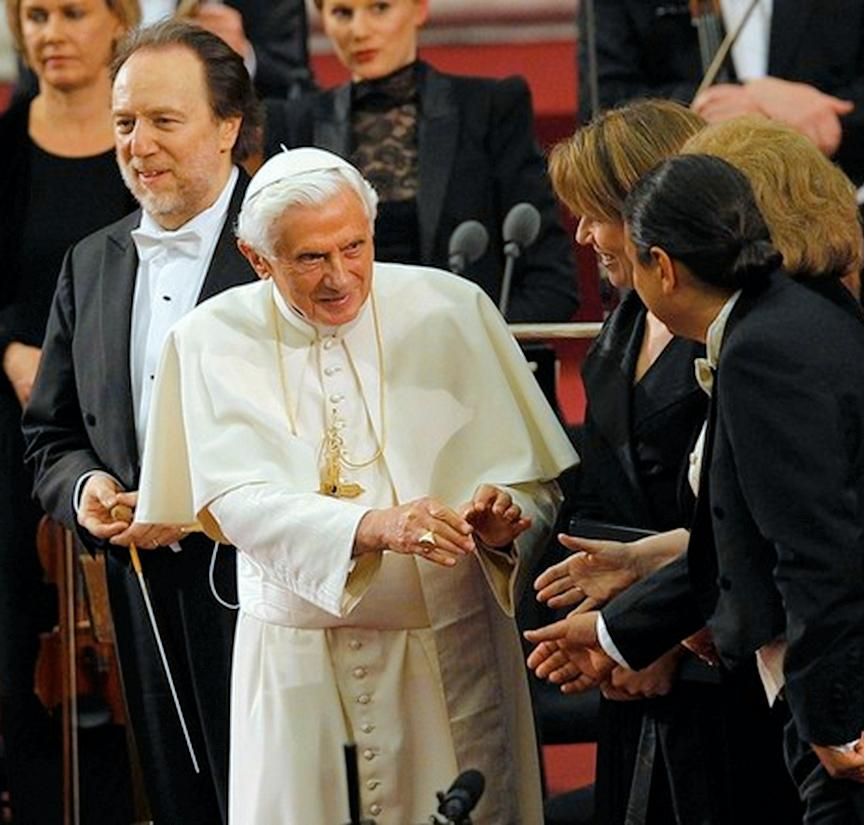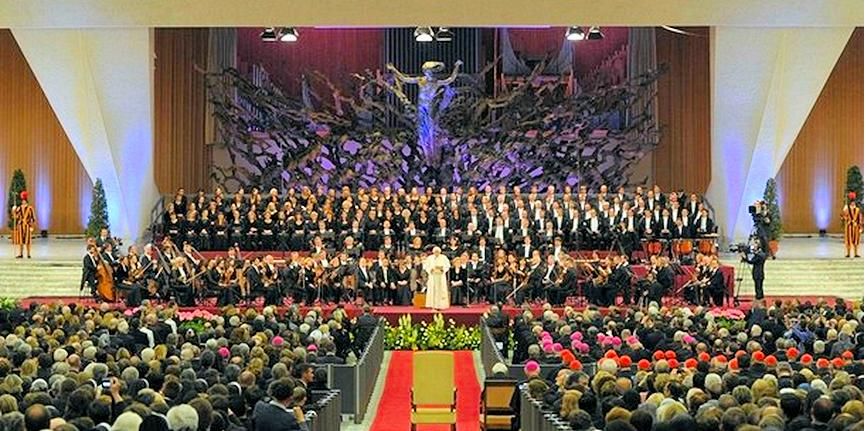| | | OFFLINE | | Post: 26.599
Post: 9.085 | Registrato il: 28/08/2005
Registrato il: 20/01/2009 | Administratore | Utente Master | |
|

 Tuesday, April 23, Fourth Week of Easter
Tuesday, April 23, Fourth Week of Easter
 ST. GEORGE (b Roman Palestine 281, d Nicomedia [now part of Turkey] 303), Soldier and Martyr
ST. GEORGE (b Roman Palestine 281, d Nicomedia [now part of Turkey] 303), Soldier and Martyr
One of the most popular saints especially in the Orthodox world, he is probably also the best-known of military saints.
His father was a famous Roman commander in Palestine in the time of Emperor Diocletian, and his mother was Judean,
but the family was Christian. George presented himself to the Emperor Diocletian in Nicomedia, then the eastern capital
of the Roman Empire, to be a soldier, and he soon became a member of his Palace Guard. However, the emperor decreed
in 302 that all Christians in the Roman army be arrested and offer sacrifices to the pagan Gods. George refused and
professed his faith before the emperor, who sought to bribe him with money and lands to change his mind. Diocletian
had no choice but to order his execution. He underwent many tortures including being dragged through the streets
before he was beheaded. His body was brought back to Palestine where Christians venerated him as a martyr. His cult
spread throughout the eastern Roman Empire and reached the west in the 5th century. He was canonized by Pope Gelasius I
in 494. The Crusades brought him new fame when the Crusaders rebuilt the fourth century basilica erected in his honor.
Chivalric orders dedicated to him sprung up all over Western Europe. England's Edward II put the Order of the Garter
under St. George's patronage, and by the 12th century, England's ships were flying the Cross of St. George. His name was
an English battlecry during the Hundred Years War. Today he is the patron saint of England, Greece, Portugal, and
Russia, among others. Images of St. George are all based on the legend of St. George and the dragon, akin to ancient
fables of a hero slaying a dragon to save a princess from death.
Readings for today's Mass:
www.usccb.org/bible/readings/042313.cfm

A HAPPY AND MOST BLESSED NAME DAY
TO POPE FRANCIS
WHO ALSO CELEBRATED 40 YEARS
AS A JESUIT YESTERDAY.
AD MULTOS ANNOS, SANCTE PATER!
Our affection and prayers go likewise to
Mons. Georg Ratzinger and
Mons. Georg Gaenswein
with our thanks for their ever-loving
support of Benedict XVI.
 AT THE VATICAN TODAY
AT THE VATICAN TODAY
No official events announced for Pope Francis, but at 10 a.m. today, he concelebrated Mass with the cardinals
present in Rome to mark the Feast of St. George at the Pauline Chapel of the Apostolic Palace.
[Traditionally, the name day and birthday of the reigning Pontiff are observed as a holiday at the Vatican, and apparently, Pope Francis has stayed with the tradition.]
Here is Vatican Radio's translation of the Pope's homily at the Mass today.
I thank His Eminence, the Cardinal Dean, for his words: thank you very much, Your Eminence, thank you.
I also thank all of you who wanted to come today: Thank you. Because I feel welcomed by you. Thank you. I feel good with you, and I like that.
The [first] reading today makes me think that the missionary expansion of the Church began precisely at a time of persecution, and these Christians went as far as Phoenicia, Cyprus and Antioch, and proclaimed the Word. They had this apostolic fervor within them, and that is how the faith spread! Some, people of Cyprus and Cyrene - not these, but others who had become Christians - went to Antioch and began to speak to the Greeks too. It was a further step. And this is how the Church moved forward. Whose was this initiative to speak to the Greeks? This was not clear to anyone but the Jews. But ... it was the Holy Spirit, the One who prompted them ever forward ... But some in Jerusalem, when they heard this, became 'nervous and sent Barnabas on an "apostolic visitation": perhaps, with a little sense of humor we could say that this was the theological beginning of the Doctrine of the Faith: this apostolic visit by Barnabas. He saw, and he saw that things were going well.
And so the Church was a Mother, the Mother of more children, of many children. It became more and more of a Mother. A Mother who gives us the faith, a Mother who gives us an identity. But the Christian identity is not an identity card: Christian identity is belonging to the Church, because all of these belonged to the Church, the Mother Church. Because it is not possible to find Jesus outside the Church. The great Paul VI said: "Wanting to live with Jesus without the Church, following Jesus outside of the Church, loving Jesus without the Church is an absurd dichotomy." And the Mother Church that gives us Jesus gives us our identity that is not only a seal, it is a belonging. Identity means belonging. This belonging to the Church is beautiful.
And the third idea comes to my mind - the first was the explosion of missionary activity; the second, the Mother Church - and the third, that when Barnabas saw that crowd - the text says: " And a large number of people was added to the Lord" - when he saw those crowds, he experienced joy. " When he arrived and saw the grace of God, he rejoiced ": his is the joy of the evangelizer. It was, as Paul VI said, "the sweet and comforting joy of evangelizing." And this joy begins with a persecution, with great sadness, and ends with joy. And so the Church goes forward, as one Saint says - I do not remember which one, here - "amid the persecutions of the world and the consolations of the Lord." And thus is the life of the Church. If we want to travel a little along the road of worldliness, negotiating with the world - as did the Maccabees, who were tempted, at that time - we will never have the consolation of the Lord. And if we seek only consolation, it will be a superficial consolation, not that of the Lord: a human consolation. The Church's journey always takes place between the Cross and the Resurrection, amid the persecutions and the consolations of the Lord. And this is the path: those who go down this road are not mistaken.
Let us think today about the missionary activity of the Church: these [people] came out of themselves to go forth. Even those who had the courage to proclaim Jesus to the Greeks, an almost scandalous thing at that time. Think of this Mother Church that grows, grows with new children to whom She gives the identity of the faith, because you cannot believe in Jesus without the Church. Jesus Himself says in the Gospel: " But you do not believe, because you are not among my sheep." If we are not "sheep of Jesus," faith does not some to us. It is a rosewater faith, a faith without substance. And let us think of the consolation that Barnabas felt, which is "the sweet and comforting joy of evangelizing." And let us ask the Lord for this "parresia", this apostolic fervor that impels us to move forward, as brothers, all of us forward! Forward, bringing the name of Jesus in the bosom of Holy Mother Church, and, as St. Ignatius said, "hierarchical and Catholic." So be it.
Obviously, with his daily short homilies delivered extemporaneously in the Mass he offers every morning at Domus Sanctae Marthae, Pope Francis is a very able preacher = who uses direct simple language very effectively, as we see very well in today's homily. I just have one comment to make about this homily - he never mentioned the saint of the day, whose name he carries.

One year ago, the Holy Father Benedict XVI met with Cardinal Leonardo Sandri, Prefect of the Congregation for Oriental Churches, and nine US bishops from the states of Washington and Alaska in northwest USA (Region XII) on their ad-limina visit.
Not finding any homily or reflection of Joseph Ratzinger online on St. George, I am re-posting instead the concert in honor of Benedict XVI's double anniversaries in April 2012 with the performance of Felix Mendelssohn=Bartholdy.s appropriately named Lobgesang (Song of Praise).

 'Song of Praise':
'Song of Praise':
A birthday concert
for the Holy Father
Translated from

April 21, 2012
On Friday afternoon, April 20, at 6 p.m., the Holy Father attended a concert to honor him on his 85th birthday, presented by the world-famous Leipziger Gewandhaus Orchestra of Leipzig, one of the oldest orchestras in the world.
It was a present to the Holy Father from the Free State of Saxony and the City of Leipzig.
Music director Ricardo Chailly conducted a performance of Felix Mendelssohn-Bartholdy's Symphony No. 2 in B-flat major, also known as the Lobgesang (Song of Praise), for soloists, chorus and orchestra.
 The Pope's brother Georg was present for the concert.
The Pope's brother Georg was present for the concert.

Here is a translation of the Holy Father's remarks after the performance:
Most Honorable Minister President,
Distinguished Guests from the Free State of Saxony and the City of Leipzig,
Eminences,
Venerated brothers in the Episcopate and Priesthood,
Ladies and Gentlemen:
He began in German:
With this splendid offering of Felix Mendelssohn-Bartholdy's Symphony No. 2, Lobgesang, you have made me - as to all those present tonight - a most precious gift for my 85th birthday.
This symphony is, in fact, a great song of praise to God, a prayer with which wee praise the Lord and thank him for his gifts.
First, however, I wish to thank all those who made this moment possible. Above all, the Gewandhaus Orchestra, which really needs no introduction - it is one of the oldest orchestras in the world with an excellent performance tradition and indisputable world renown.
Heartfelt thanks as well to the outstanding choirs and soloists, but most especially, to Maestro Riccardo Chailly, for their moving interpretation.
And my thanks to the Minister President and representatives of the Free State of Saxony, the Mayor and delegation from the City of Leipzig, the Church authorities and the officials of the Gewandhaus, and all who have come here from Germany.
He continued in Italian:
Mendelssohn, the Lobgesang Symhony, Gewandhaus: Three elements linked to each other not just tonight but from the very start. The great symphony for chorus, soloists and orchestra that we have heard was in fact composed by Mendelssohn to celebrate the fourth centenary of the invention of the printing press, and was performed for the first time at the Thomaskirche, the church of Johann Sebastian Bach, on June 25, 1840, by the Gewandhaus Orchestra. On the podium was Mendelssohn himself, who for years was the director of this venerable and prestigious orchestra.
This composition is made up of three movements for orchestra and then a sort of cantata with soloists and chorus. In a letter to his friend Karl Klingemann, Mendelssohn explained that in this symphony, "first the instruments give praise in their congenial way, followed by the chorus and the solo voices".
Art as praise of God - the supreme Beauty - was the basis for Mendelssohn's way of composition, and not just for liturgical and sacred music.
As Julius Schubring said, for Mendelssohn, sacred music per se was not a step above other music, but that each kind of music, in its way, must serve to honor God. And the motto that Mendelssohn wrote on the manuscript of the Lobgesang was: "I wish to see all the arts, especially music, in the service of He who created and gave them to us".
The ethico-religious world of our composer was not separate from his concept of art, but was an integral part of it: "Art and Life are not two different things" but one, he wrote. A profound unity that has its unifying element in faith, which characterized all of Mendelssohn's existence and guided all his decisions.
We see this common thread in all his letters. To his friend Schirmer on January 9, 1841, he wrote, referring to his family: "Of course, we do not lack for concerns and difficult days... Nonetheless, we can only pray fervently to God to keep us in the health and happiness he has given us". And on January 17, 1843, he wrote to Klingemann: "Every day I can only thank God on my knees for every good that he has given me".
Thus, he had a faith that was solid, deeply felt, and nourished profoundly by Sacred Scripture, which is shown, among others by his Oratorios on Paul and Elias, and the symphony we just heard, which is full of Biblical references, especially from the Psalms and St. Paul.
It would be difficult to cite all the intense moments that we have experienced tonight. But I would only wish to recall the marvellous duet between the sopranos and the choirs on the words, «Ich harrete des Herrn, und er neigte sich zu mir und hörte mein Fleh’n» (I placed my hope in the Lord and he bent down to me and listened to my plea). It is the hymn of someone who places all his hope in God and knows with certainty that he will not be disappointed.
He reverted to German:
Once more, I wish to thank the Orchestra and the Choir of the Gewandhaus, the Choir of the Mitteldeutschen Rundfunk [MDR, the Saxon broadcasting agency], the soloists and the Maestro, as well as all the representatives of the Free State of Saxony and the City of Leipzig for the presentation of this 'work of light', as Robert Schumann called it.
Through this, you have given us all the chance to praise God and in a special way, I can once again thank God for the years of my life and of my ministry.
He ended in Italian:
I wish to conclude with the words that Robert Schumann wrote in the magazine Neue Zeitschrift für Musik after having heard the first performance of the symphony we heard. They are an invitation on which to reflect: "Let us - as the text so splendidly set to music by the Maestro, ever more abandon works of darkness and take up the weapons of light".
Thank you to everyone, and good night.


 Apropos, Marcianum Press of Venice recently published an anthology of all the post-concert remarks made by Benedict XVI during his Pontificate - one of the 'dozens' of books that have been published since February 11 about our beloved Benedict. I shall have an appropriate post later.
Apropos, Marcianum Press of Venice recently published an anthology of all the post-concert remarks made by Benedict XVI during his Pontificate - one of the 'dozens' of books that have been published since February 11 about our beloved Benedict. I shall have an appropriate post later.

[Modificato da TERESA BENEDETTA 23/04/2013 16:30] |